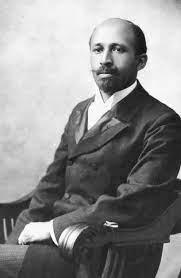Du Bois, E. B. William

Bio: (1868-1963) American sociologist and historian. William Du Bois's scientific and activist work was marked by the fact that he grew up as an African-American in the southern United States, immediately after the Civil War and the abolition of the institution of slavery. Du Bois received his doctorate from Harvard University in 1895 and later began working as a researcher at the University of Pennsylvania, which allowed him to do a large urban ethnographic study of the lives of African Americans in Pennsylvania. Du Bois's theoretical contribution is manifold. As a student of William James, Du Bois studied the “self” of African Americans in a similar vein. That self is marked by "duality", double consciousness - "every African-American perceives himself as a black man", but also as an American.
Du Bois studied the resurgence of institutional racism in the American South, embodied in segregation laws popularly called Jim Crow Laws. After the end of the Civil War (1865), the proclamation of emancipation and the fifteenth amendment to the American Constitution guaranteed physical freedom, but also the political rights of African Americans. However, since 1877, laws requiring mandatory racial segregation in public places have been introduced in many southern states. Du Bois explains this renewal of official racism through economic and political macro-processes, inspired by theories of historical materialism. After the abolition of slavery, four million former slaves left the plantations, most of whom were illiterate and untrained for any other job. These former slaves made great efforts to make progress, but the structural circumstances did not help them. The economic crisis threatened the jobs of poor whites in the south, so they benefited economically from the introduction of segregation. Political conflicts between the two political currents have enabled a compromise to be reached between the north and the south over the introduction of segregation. Towards the end of his life, Du Bois began researching the influence of Africa on the political and economic history of the planet.
Du Bois was also very active in empowering African Americans. He advocated that as many of them as possible graduate from college so that they would have a positive impact on others. In 1910, he was one of the founders of the National Association for the Advancement of Colored People (NAACP), one of the most important organizations that fought for African American rights; he organized several pan-African congresses; he was also the founder of two of the first African American newspapers Moon Illustrated Weekly (1905) and The Horizon: A Journal of the Color Line (1907-1910). His views on the best strategies for the advancement of African Americans differed from those of two other highly important champions for the rights of African Americans –Booker T. Washington and Marcus Garvey.
Fields of research
City Crisis Economy Freedom Geography Personality Politics Poverty Race Segregation Slavery WorkTheoretical approaches
Afro-American StudiesMain works
The Study of the Negro Problems (1898);
The Philadelphia Negro (1899);
The Negro in Business (1899);
The Souls of Black Folk (1903);
The Negro (1915);
The Gift of Black Folk (1924);
Africa, Its Geography, People and Products (1930);
Africa: Its Place in Modern History (1930);
Black Reconstruction in America (1935);
What the Negro Has Done for the United States and Texas (1936);
Black Folk: Then and Now (1939);
Color and Democracy: Colonies and Peace (1945);
The Encyclopedia of the Negro (1946);
The World and Africa (1946).

